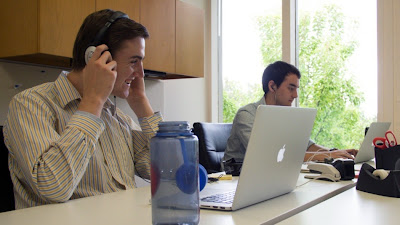It's the end of summer and many students are coming out of a brief dip into the professional world working alongside adults and performing entry level tasks, only to return back to classes in the fall. Some are paid, some are not some provide both learning opportunities and a chance to build one's network, others less so. Across the board, most students will say that an internship is a better investment of time than sitting at home, or working a regular summer job.
But some students have found summer experiences that are, arguably, better for their careers — especially those students interested in entrepreneurship, not joining corporate life.
I asked seven students who participated in Lightspeed Venture Partners' summer fellowship — a program that behaves like a startup accelerator without taking equity from the teams — how the experience compared to a summer internship, and what knowledge they'll be taking back to school.
Would you consider a non-traditional summer program? Tell us in the comments.
Q&A With Lightspeed Venture Partners Summer Fellows
How did you hear about the program?
I read Y Combinator's Hacker News quite a bit. One day when I was browsing, I came across this. We decided to apply and the rest is history. - William Zhou, Planboard
Several of our friends have gone through the Lightspeed program and we heard only good things. - Feross Aboukhadijeh, peerCDN
Through the Stanford Bitcoin Group, a small collection of 8 students with a common interest in Bitcoin. - Matthew Rials, TryBTC
Are you ever too young to start a company?
I think so. At Stanford, various friends were poised to drop out or take time off of school to start a venture. I can't help but think that these folks may have missed out on some of the wonders of American college life. - Giancarlo Daniele, Drive Pulse
You're never too young to start a company. I started my first company when I was in Grade 10 in high school. My former Co-Founder, David Kim, and I started a web design firm. Slowly, our client base grew, but we were tired of all of their rules. We decided to scratch our own itch. We ended up launching Draftboard for the designer community [2] in Grade 12. That just shows you how young we were in our ventures. - William Zhou, Planboard
Will you continue with your project after the summer is over?
We certainly plan to carry on our project as we transition back to Stanford, once summer has ended. We are very passionate about the notion of spreading Bitcoin to the world and easing the average user's transition into the new currency, and we will continue to work on TryBTC for as long as that takes. We have already raised enough money to keep things running through school, and our investment terms allow for us to remain enrolled in classes. - Matthew Rials, TryBTC
Absolutely. During this summer we’ve had amazing traction with Contastic – our mobile CRM product. The team has grown from 1 person (just me) to six during the 10 weeks. Together, we’ve been able to build a complete product and land pilots at several fortune 500 companies. With the support of Lightspeed and our early customers we’ve been able to develop a truly unique product that will improve the lives of salespeople worldwide. - Cy Khormaee, Contastic
Why did you choose this program over a regular internship?
There are few more rewarding ways to spend working hours than to directly think up and build products and wait to see how people use them. You can't usually do this at a traditional internship. - Giancarlo Daniele, Drive Pulse
There's nothing in the world like working for yourself — no pointy haired boss, no managers — just complete control over how you spend your time and what you make of your life. Starting a company is a high-stress, high-risk decision, but it's also high in learning, impact, and fun. We don't wish that we were doing anything else. - Feross Aboukhadijeh, peerCDN
What did you learn over the course of the summer?
While its true that I became a better programmer, the majority of what I learned this summer would fall into the "professional development" category. There are an astonishing number of soft skills that are absolutely crucial to managing a company, and the people that work for it.
For instance, taking a product from prototype to production involves managing relationships with hardware designers and manufacturers, electronics designers and manufacturers, packaging designers, retailers, your own internal sales team, your product development team of engineers, your lawyers, your investors, and co-founders. If for example, you didn't know what to look for in a designer when you interviewed your first, you certainly get a better sense by the time you speak to the tenth. Lastly, the most empowering takeaway from the summer is the following:
I validated that being an entrepreneur is what I was born to do. Whether in this venture or another I have equipped myself with the skills I need to be a successful visionary and leader, and am incredibly grateful for the opportunity Lightspeed gave me to do so. - Aaron Konigsberg, Lapshark via

















0 comments:
Post a Comment